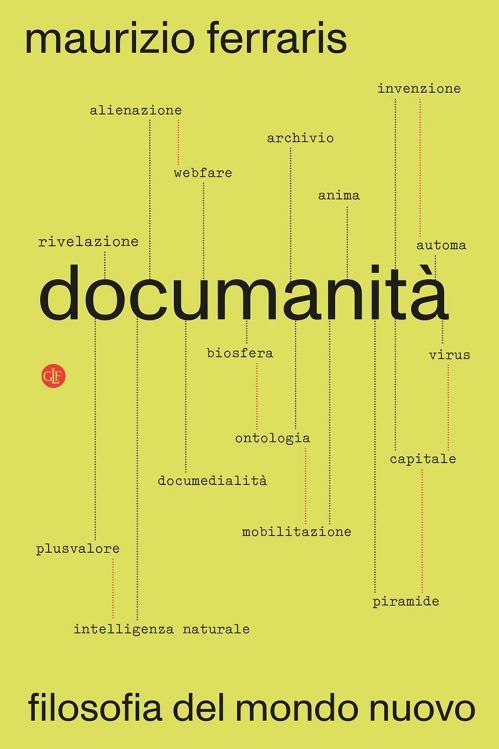A good map
A book by Maurizio Ferraris provides a different and significant reading of today and, above all, of what tomorrow could be.
Good maps to see where you are; good compasses to find the best path forward. Everyone needs them. Including those who – whether entrepreneurs or managers – find themselves responsible not only for themselves but also for women and men who undertake the adventurous journey of setting up a business. A good map for understanding, which is also a compass for finding one’s way; this is exactly what the latest book by Maurizio Ferraris – Documanità. Filosofia del mondo nuovo (Dochumanity. A philosophy for the new world) –, which describes the present, and especially the future, with an approach that’s extremely stimulating approach, to be thoroughly enjoyed.
The author’s starting point is the realisation that relying on the past to think about the future is now obsolete and useless, because the “technological revolution” we are experiencing has radically changed all terms of comparison.
The web, Ferraris explains, is the largest recording device that humanity has developed so far, and this explains the importance of the changes it has produced. Suffice to say that although one human being out of two does not yet own a mobile phone, the number of connected devices totals 23 billion: more than three times the world’s population. This connection produces every day a number of socially relevant objects, a higher number than all those produced by all factories around the world: a huge amount of actions, contacts, transactions and trails encoded in 2.5 quintillion bytes. The available number of signs that can be manipulated and combined becomes immeasurably greater than in any other previous culture, and this changes everything.
From here, as we were saying, Ferraris’s book begins a prologue dedicated to describing the “new world”, and then continues with a first part devoted to portraying the nature of the web and a second and third parts that narrate ourselves and our origins. The fourth and last part, finally, addresses the crucial question: where are we going? Ferraris has written a great book. Naturally, it includes passages that are fascinating yet not always easy to read; nonetheless, it is not difficult to find ourselves immersed, together with the author, in a world – our world – seen through different eyes, yet finding familiar points of reference such as those dedicated to automation, information, environment, biosphere, the meaning of work, merit, production, goods, education, consumption.
From all this, a radical revision of the conceptual construction of our ways of looking at technology, humanity and capital, arises. A magnificent book, to be read and re-read.
Documanità. Filosofia del mondo nuovo (Dochumanity. A philosophy for the new world)
Maurizio Ferraris
Laterza, 2021


A book by Maurizio Ferraris provides a different and significant reading of today and, above all, of what tomorrow could be.
Good maps to see where you are; good compasses to find the best path forward. Everyone needs them. Including those who – whether entrepreneurs or managers – find themselves responsible not only for themselves but also for women and men who undertake the adventurous journey of setting up a business. A good map for understanding, which is also a compass for finding one’s way; this is exactly what the latest book by Maurizio Ferraris – Documanità. Filosofia del mondo nuovo (Dochumanity. A philosophy for the new world) –, which describes the present, and especially the future, with an approach that’s extremely stimulating approach, to be thoroughly enjoyed.
The author’s starting point is the realisation that relying on the past to think about the future is now obsolete and useless, because the “technological revolution” we are experiencing has radically changed all terms of comparison.
The web, Ferraris explains, is the largest recording device that humanity has developed so far, and this explains the importance of the changes it has produced. Suffice to say that although one human being out of two does not yet own a mobile phone, the number of connected devices totals 23 billion: more than three times the world’s population. This connection produces every day a number of socially relevant objects, a higher number than all those produced by all factories around the world: a huge amount of actions, contacts, transactions and trails encoded in 2.5 quintillion bytes. The available number of signs that can be manipulated and combined becomes immeasurably greater than in any other previous culture, and this changes everything.
From here, as we were saying, Ferraris’s book begins a prologue dedicated to describing the “new world”, and then continues with a first part devoted to portraying the nature of the web and a second and third parts that narrate ourselves and our origins. The fourth and last part, finally, addresses the crucial question: where are we going? Ferraris has written a great book. Naturally, it includes passages that are fascinating yet not always easy to read; nonetheless, it is not difficult to find ourselves immersed, together with the author, in a world – our world – seen through different eyes, yet finding familiar points of reference such as those dedicated to automation, information, environment, biosphere, the meaning of work, merit, production, goods, education, consumption.
From all this, a radical revision of the conceptual construction of our ways of looking at technology, humanity and capital, arises. A magnificent book, to be read and re-read.
Documanità. Filosofia del mondo nuovo (Dochumanity. A philosophy for the new world)
Maurizio Ferraris
Laterza, 2021
